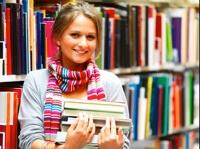Education
Autor: ivka47
Typ práce: Maturita
Typ práce: Maturita
Dátum: 06.10.2011
Jazyk:
Jazyk:
Rozsah: 1 070 slov
Počet zobrazení: 12 463
Počet zobrazení: 12 463
Tlačení: 639
Uložení: 648
Uložení: 648
EDUCATION
School attendance in the Slovak Republic is compulsory from the age from 6 – 15. There are state, private and church schools in our republic. Education at state schools up to 18 is free of charge but students have to pay for some materials and textbooks. All schools are coeducational meaning both boys and girls attend the same school. We don’t have to wear school uniforms. There are special schools for handicapped children. The school year starts on 2nd September and ends on 30th June of the following year. A school day is different at different types of schools. The average number of lessons at a secondary school is around 30 a week, primary schools have fewer lessons. At our school classes begin at 7:30 am and can finish at different time. Breaks between the lessons last for 10 to 20 minutes. Pupils and students are evaluated by marks from 1 to 5. One is the best, five is the worst. Each term students get their school report with marks from both compulsory and elective subjects, which are not marked at our school.
Pre-school education is provided by crèches for children up to 3 years of age and nursery school for children aged 3 to 6. Not many children attend crèches but quite a lot of them attend the kindergartens. At 6 children start to go to primary schools and they stay there until 15. At the age of 15 the pupils transfer from primary to secondary school. Some pupils can transfer to grammar school at the age of 11, after they have passed an entrance exam.
At the age of 16 pupils can choose among a variety of secondary schools:
a) Grammar schools with general and rather academic education which prepare students for university study.
b) Special schools, which include technical colleges specialized in building, chemistry, engineering, etc, business academies, agricultural schools, music and art schools, offer professional education.
c) Vocational schools train would-be workers for practical jobs
Secondary education usually lasts for 4 years and at grammar and specialized schools it is finished with school-leaving examination. Nowadays you have to choose 5 subjects (Slovak, one foreign language, one science subject and two optional subjects chosen from foreign languages, science subjects or humanities). It is divided into two parts, internal and external. The external involves writing essay from Slovak language and tests and essays from foreign languages and tests from maths. It is held in April. The internal part is all about oral examination and is held for 5 days usually in the end of May or in June. After the graduates have passed their school-leaving exam they receive the School-Leaving Certificate and they can apply for study at universities and colleges.
Universities and colleges last from 4 to 6 years. Each graduate can apply for as many universities and colleges as he/she likes, but before he/she is accepted they have to pass an entrance examination in the subjects which the university specializes in. The examination consists of written text and an interview. The university and college students can enrol at courses for Bachelor’s degree after finishing which they can continue in a Master’s degree course. Medicine usually takes 6 years. The university or college study is finished with state examination and every undergraduate also has to write thesis (diplomovka) in order to receive a diploma in a certain field of study. The diploma is handed over at a graduation ceremony. Doctoral degrees are awarded another few years of study, which may be also individual, and completion of another thesis.
Most of educational facilities have their own canteen. If they don’t, the students are given the possibility to eat at a different place, usually another school’s canteen. Students can also eat at home or at school food brought from home. Our canteen is not very spacious but the kitchen is very good.
For most students their social life begins at the secondary school. They make new friends to go out with after the school, are permitted to go to downtown on every Friday evening or do sports to look better. They can take part in various competitions like English or German language competition. Students have got little pocket money, if any, so they travel abroad looking for jobs. They do almost everything unless it’s well-paid. They sacrifice their free time but can afford to spend much more during the school year.
Here, at the secondary school, the young people begin making real friendship, looking for true love or just pleasure, learn how to become an adult. The have to take responsibility for their actions. They make friends for life here and some even find their life-partner. One of the biggest advantages of the secondary school is emphasis which is given on the study of foreign languages. An average graduate must be able to communicate in at least one foreign language. We can choose from English, German and French, there are schools with Russian, Hungarian, Spanish or Latin. University and college studies include foreign language too and most of them offer various student exchanges with partner universities/colleges abroad. If the students are exchanged they usually live in the families of their exchange partner, but a student can be simply sent to study abroad. It’s becoming popular to frequent a language course in one’s free time because of the rising need of people able to speak more languages. Another way of gaining language experience is working abroad as an au-pair, which means living with a family and looking after the children and sometimes doing the housework.
During all the studies the student develops some sort of relationship with every teacher which he gets in touch with. Basically, their relationship is formal, but at basic school teachers take more care about their pupils, mostly the younger ones, they are interested in their life and family background. Communication between them is closer; they are more like parents to their pupils. At secondary school teachers are more like friends but this relationship is not as close as at basic school. They don’t have as much influence on our personality as they have on our future. And, if the teacher isn’t friendly we begin to dislike the subject as well. But many good teachers know how to find their way to the students’ hearts and make them love their subject.
School attendance in the Slovak Republic is compulsory from the age from 6 – 15. There are state, private and church schools in our republic. Education at state schools up to 18 is free of charge but students have to pay for some materials and textbooks. All schools are coeducational meaning both boys and girls attend the same school. We don’t have to wear school uniforms. There are special schools for handicapped children. The school year starts on 2nd September and ends on 30th June of the following year. A school day is different at different types of schools. The average number of lessons at a secondary school is around 30 a week, primary schools have fewer lessons. At our school classes begin at 7:30 am and can finish at different time. Breaks between the lessons last for 10 to 20 minutes. Pupils and students are evaluated by marks from 1 to 5. One is the best, five is the worst. Each term students get their school report with marks from both compulsory and elective subjects, which are not marked at our school.
Pre-school education is provided by crèches for children up to 3 years of age and nursery school for children aged 3 to 6. Not many children attend crèches but quite a lot of them attend the kindergartens. At 6 children start to go to primary schools and they stay there until 15. At the age of 15 the pupils transfer from primary to secondary school. Some pupils can transfer to grammar school at the age of 11, after they have passed an entrance exam.
a) Grammar schools with general and rather academic education which prepare students for university study.
b) Special schools, which include technical colleges specialized in building, chemistry, engineering, etc, business academies, agricultural schools, music and art schools, offer professional education.
c) Vocational schools train would-be workers for practical jobs
Secondary education usually lasts for 4 years and at grammar and specialized schools it is finished with school-leaving examination. Nowadays you have to choose 5 subjects (Slovak, one foreign language, one science subject and two optional subjects chosen from foreign languages, science subjects or humanities). It is divided into two parts, internal and external. The external involves writing essay from Slovak language and tests and essays from foreign languages and tests from maths. It is held in April. The internal part is all about oral examination and is held for 5 days usually in the end of May or in June. After the graduates have passed their school-leaving exam they receive the School-Leaving Certificate and they can apply for study at universities and colleges.
Universities and colleges last from 4 to 6 years. Each graduate can apply for as many universities and colleges as he/she likes, but before he/she is accepted they have to pass an entrance examination in the subjects which the university specializes in. The examination consists of written text and an interview. The university and college students can enrol at courses for Bachelor’s degree after finishing which they can continue in a Master’s degree course. Medicine usually takes 6 years. The university or college study is finished with state examination and every undergraduate also has to write thesis (diplomovka) in order to receive a diploma in a certain field of study. The diploma is handed over at a graduation ceremony. Doctoral degrees are awarded another few years of study, which may be also individual, and completion of another thesis.
Most of educational facilities have their own canteen. If they don’t, the students are given the possibility to eat at a different place, usually another school’s canteen. Students can also eat at home or at school food brought from home. Our canteen is not very spacious but the kitchen is very good.
For most students their social life begins at the secondary school. They make new friends to go out with after the school, are permitted to go to downtown on every Friday evening or do sports to look better. They can take part in various competitions like English or German language competition. Students have got little pocket money, if any, so they travel abroad looking for jobs. They do almost everything unless it’s well-paid. They sacrifice their free time but can afford to spend much more during the school year.
Here, at the secondary school, the young people begin making real friendship, looking for true love or just pleasure, learn how to become an adult. The have to take responsibility for their actions. They make friends for life here and some even find their life-partner. One of the biggest advantages of the secondary school is emphasis which is given on the study of foreign languages. An average graduate must be able to communicate in at least one foreign language. We can choose from English, German and French, there are schools with Russian, Hungarian, Spanish or Latin. University and college studies include foreign language too and most of them offer various student exchanges with partner universities/colleges abroad. If the students are exchanged they usually live in the families of their exchange partner, but a student can be simply sent to study abroad. It’s becoming popular to frequent a language course in one’s free time because of the rising need of people able to speak more languages. Another way of gaining language experience is working abroad as an au-pair, which means living with a family and looking after the children and sometimes doing the housework.
During all the studies the student develops some sort of relationship with every teacher which he gets in touch with. Basically, their relationship is formal, but at basic school teachers take more care about their pupils, mostly the younger ones, they are interested in their life and family background. Communication between them is closer; they are more like parents to their pupils. At secondary school teachers are more like friends but this relationship is not as close as at basic school. They don’t have as much influence on our personality as they have on our future. And, if the teacher isn’t friendly we begin to dislike the subject as well. But many good teachers know how to find their way to the students’ hearts and make them love their subject.
| Podobné práce | Typ práce | Rozsah | |
|---|---|---|---|
|
|
Education (konverzačná téma) | Ostatné | 2 370 slov |
|
|
Education – Sloh po anglicky vzdelanie | Referát | 1 119 slov |
|
|
Education | Ostatné | 2 418 slov |
|
|
Education essay | Maturita | 757 slov |
|
|
Education – UK, USA (Anglický jazyk) | Maturita | 852 slov |
|
|
Education (Anglický jazyk) | Maturita | 611 slov |
|
|
The System of education in GB and CZ – maturitná otázka | Maturita | 1 829 slov |
|
|
Education topics to talk about | Maturita | 2 886 slov |
|
|
Education (slovné spojenia a frázy) | Maturita | 613 slov |
|
|
Education in Slovakia | Ostatné | 521 slov |
|
|
Education – Vypracované zadanie na VIDEO | Maturita | 9 slov |
|
|
Education (topic, essay, vocabulary) | Ostatné | 630 slov |
|
|
Education téma | Maturita | 832 slov |
|
|
Education | Učebné poznámky | 507 slov |
|
|
Education in Slovakia, Great Britain, and the USA – osnova na prezentáciu | Ostatné | 269 slov |
Vyhľadaj ďalšie študentské práce pre tieto populárne kľúčové slová:
#young people and education #what you most like and dislike about being a student #education #Good teacher #essay #can a Book Still Be Your Best Friend? Writhe an essay #teachers good educators #education maturita #letter to an exchange student #students life #studying abroad #letter to a exchange student #letter education #young people education #My best school day ever #life in our school #lifelong education #educatiom #Language course #education and schoolsOdporúčame
Cudzie jazyky » Angličtina
:: Exchange Rates Euro
:: KATEGÓRIE – Referáty, ťaháky, maturita:
Vygenerované za 0.016 s.
















